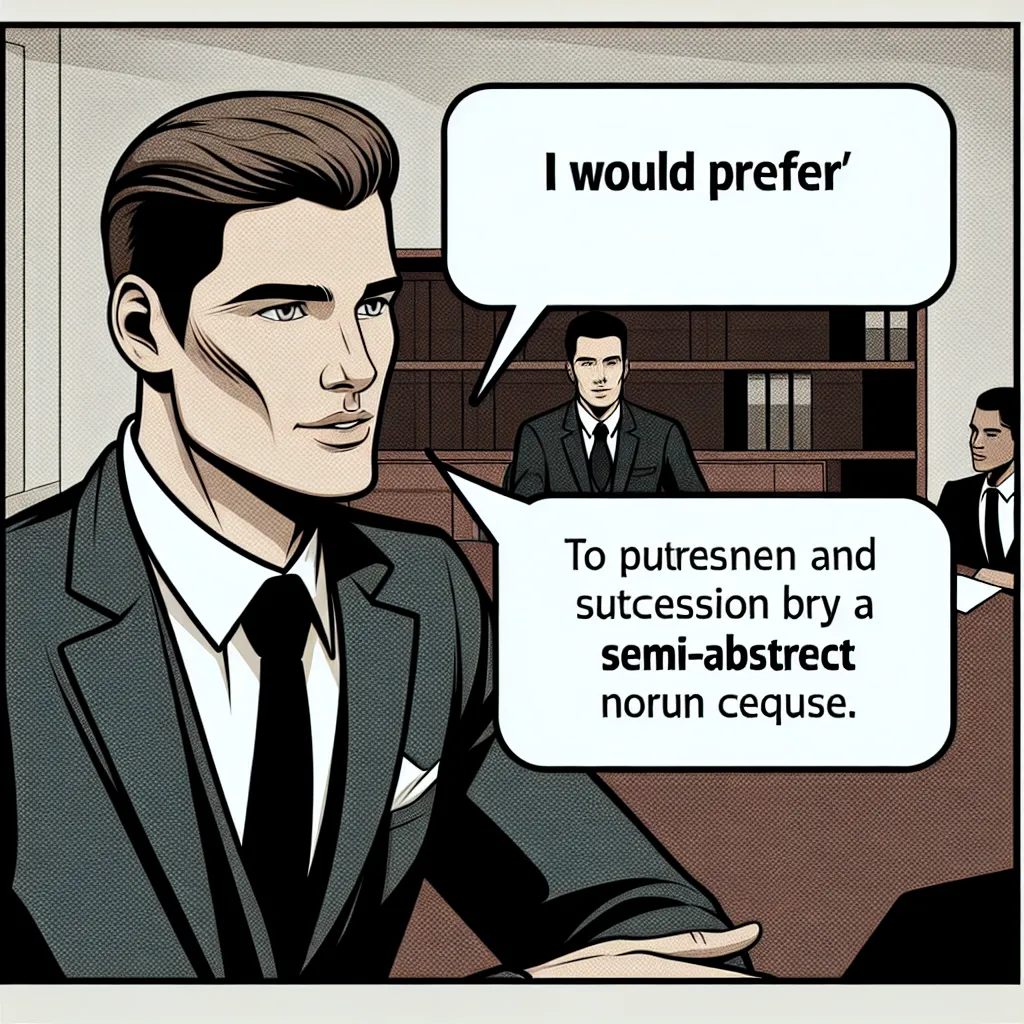Understanding and effectively using complex grammatical structures like “would prefer” followed by a noun clause can significantly boost your IELTS score. This construction is particularly useful in expressing preferences and hypothetical situations, which are common themes in both the Speaking and Writing sections of the IELTS test. Let’s delve into the intricacies of this structure and explore how to use it to elevate your English proficiency.
The Meaning and Frequency of “Would Prefer” + Noun Clause in IELTS
The structure “would prefer” + noun clause is used to express a preference for one thing over another, often in hypothetical situations. It’s a more formal and polite way to state preferences compared to simpler structures like “I like” or “I want.” This construction appears regularly in IELTS exams, particularly in Speaking Part 3 and Writing Task 2, where candidates are expected to discuss abstract ideas and express opinions.
Examples:
- I would prefer that we discuss this matter in private.
- The company would prefer if employees arrived on time.
- She would prefer that her colleagues respect her personal space.
In these examples, the noun clauses (underlined) follow “would prefer,” providing more detailed information about the preference.

Grammar Formula and Analysis
The basic formula for this structure is:
Subject + would prefer + [that/if/when] + noun clause
Let’s break down the components:
- “Would prefer” is the main verb phrase expressing preference.
- The noun clause can be introduced by “that,” “if,” or “when,” depending on the context.
- The verb in the noun clause is typically in the subjunctive mood or simple past tense.
Application in Different IELTS Sections
-
IELTS Speaking:
In Part 3, you might be asked about preferences in various contexts.Example: “How do you think workplaces will change in the future?”
Response: “I would prefer that companies adopt more flexible working hours. This could lead to improved work-life balance for employees.” -
IELTS Writing Task 2:
When discussing societal issues or personal opinions, this structure can add sophistication to your writing.Example: “Many would prefer that governments invest more in renewable energy sources rather than continuing to rely on fossil fuels.”
Sample Passages and Sentences
Speaking Part 3 Sample
Examiner: “What changes would you like to see in education systems?”
Candidate: “Well, I would prefer that schools focus more on practical skills alongside academic subjects. Additionally, I would prefer if students had more opportunities for hands-on learning experiences. It’s also important that educators adapt their teaching methods, so I would prefer that they receive regular training in new pedagogical approaches.”
Analysis: The candidate uses the “would prefer” + noun clause structure three times, demonstrating a range of applications and showcasing advanced grammar usage.
Writing Task 2 Sample Paragraph
Topic: The role of technology in modern society
“While technology has undoubtedly improved many aspects of our lives, some argue that it has also led to decreased human interaction. Many people would prefer that social media platforms implement features to encourage more meaningful connections. Furthermore, employers would prefer if their staff maintained a healthy balance between digital and face-to-face communication. In educational settings, teachers often would prefer that students engage in collaborative projects rather than relying solely on online resources. Ultimately, society would prefer when technology enhances rather than replaces human relationships.”
Analysis: This paragraph integrates the “would prefer” structure four times, each with a different noun clause introducer (that, if, that, when). This variety demonstrates a high level of grammatical control and sophistication.
Achieving Higher Band Scores with “Would Prefer” + Noun Clause
To achieve higher band scores in IELTS, it’s crucial to use complex structures accurately and appropriately. Here’s how using “would prefer” + noun clause can help you reach different band scores:
-
Band 6: Basic use of the structure with some errors
Example: “I would prefer that people are more kind.” (Minor error in verb tense) -
Band 7: Correct use of the structure with some variation
Example: “I would prefer if people were more considerate of others’ feelings.” -
Band 8-9: Consistent and accurate use with a range of noun clause introducers and in various contexts
Example: “Environmentalists would prefer that governments implement stricter regulations on carbon emissions, while industry leaders would prefer when such changes are introduced gradually to minimize economic disruption.”
Common Errors to Avoid
-
Incorrect verb tense in the noun clause:
Incorrect: “I would prefer that he comes early.”
Correct: “I would prefer that he come early.” (subjunctive mood) -
Omitting “that” in formal writing:
Less formal: “I would prefer people respect my privacy.”
More formal: “I would prefer that people respect my privacy.” -
Confusing “would prefer” with “would rather”:
Incorrect: “I would prefer to stay home than go out.”
Correct: “I would prefer to stay home rather than go out.” or “I would rather stay home than go out.” -
Using “to” after “prefer”:
Incorrect: “I would prefer to that we meet earlier.”
Correct: “I would prefer that we meet earlier.” -
Overusing the structure:
While it’s important to showcase your grammar skills, overusing any structure can make your speech or writing sound unnatural. Aim for a balance with other ways of expressing preferences and opinions.
Conclusion
Mastering the “would prefer” + noun clause structure can significantly enhance your IELTS performance. It allows you to express preferences and hypothetical situations with precision and sophistication. Remember to practice using this structure in various contexts, paying attention to the correct verb forms in the noun clause. By incorporating this advanced grammar point into your English repertoire, you’ll be better equipped to handle complex topics in both the Speaking and Writing sections of the IELTS test. Keep practicing with different scenarios and remember to balance this structure with other forms of expression to achieve a natural, fluent communication style.